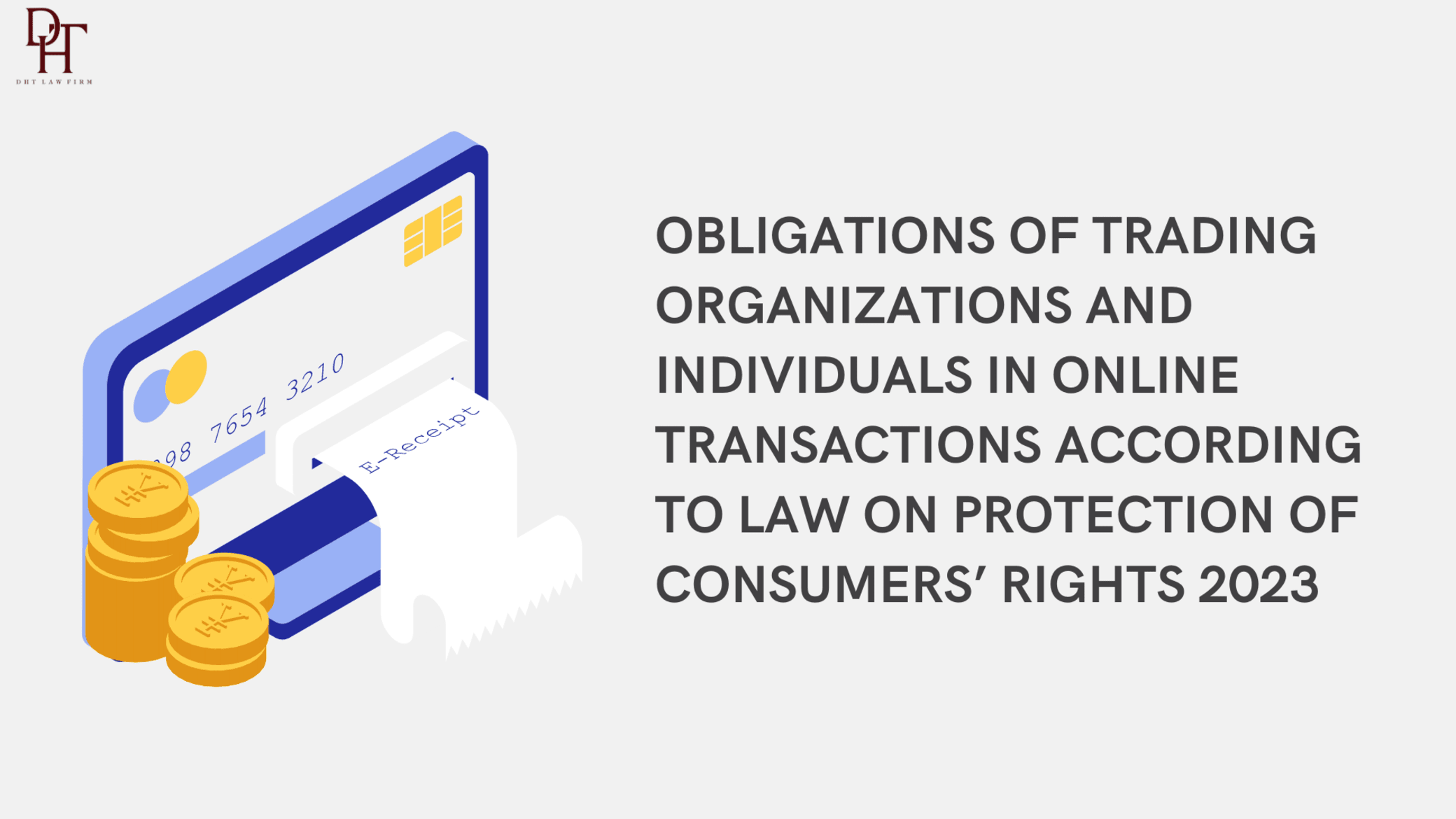
OBLIGATIONS OF TRADING ORGANIZATIONS AND INDIVIDUALS IN ONLINE TRANSACTIONS ACCORDING TO THE LATEST REGULATIONS OF LAW ON PROTECTION OF CONSUMERS’ RIGHTS 2023
In today's era, e-commerce has become a trend and occupies an increasing proportion in the national trading system. The number of consumers shopping online in Vietnam has skyrocketed in recent years, it is estimated that in 2022, it will reach about 60 million people, accounting for about 58.2% of the population. The large number of consumers participating in online shopping combined with the flexible, difficult to control and rapidly changing nature of the internet environment requires close and strict regulation of the law. The new Law on Protection of Customer’s Rights was promulgated in June 2023 with specific regulations on the obligations of trading organizations and individuals in online transactions, creating an appropriate legal framework for protection and securing of Consumers' legitimate rights and interest in online transactions.
1. Definitions of trading organizations and individuals in online transactions in accordance with the Law on Protection of Customer’s Rights 2023
1.1. Definition of online transactions
According to Clause 5, Article 3 of the Law on Protection of Consumer Rights 2023, a transaction is defined as an online transaction when it simultaneously meets the following 02 conditions:
(i) Is a transaction made in cyberspace
(ii) Consumers are not allowed to inspect and directly contact products, goods and services before participating in transactions.
1.2. Definition of online trading organizations and individuals

According to Clause 1, Article 39 of the Law on Protection of Consumer Rights 2023, online trading organizations and individuals include 02 groups:
Firstly, organizations and individuals trading products, goods and services through self-established information systems or intermediary digital platforms.
Secondly, organizations establishing and operating an intermediary digital platform.
The Law on Protection of Consumer Rights 2023 previously provided a definition of "intermediary platforms" as information systems set up and operated by organizations and individuals to provide an environment in cyberspace for other organizations and individuals to transact with consumers. This provision was omitted when the official Law on Protection of Consumer Rights was promulgated, and up to this point, there have been no other specific regulations related to this definition. Referring to the provisions of the Draft Law, it is possible to identify typical examples of intermediary digital platforms as e-commerce platforms such as Shopee, Lazada, Sendo, Tiki,... Thus, enterprises that establish and operate these e-commerce platforms or individuals and organizations trading products, goods and services through these e-commerce platforms are considered as online trading organizations and individuals and have to fulfill their obligations under the Law on Protection of Consumer Rights.

2. Obligations of trading organizations and individuals in online transactions according to the regulations of the Law on Protection of Consumer Rights 2023
2.1. General obligations of trading organizations and individuals in online transactions
- Obligation to provide information
Clause 1, Article 37 of the Law on Protection of Consumer Rights stipulates that, when conducting online transactions, trading organizations and individuals must accurately and fully provide consumers with the following information:
- Name, address, phone number, other contact method (if any) of the trading organization or individual or the representative of the organization or individual doing business in Vietnam;
- Enterprise registration certificate number or enterprise code or other equivalent document for economic organizations; personal tax identification number for individuals;
- Measurement, quantity, volume, quality, utility, price, origin, shelf life of products, goods and services;
- Delivery costs (if any);
- Payment method and term; time, place and method of selling and providing products, goods and services; conditions and methods of exchanging and returning products, goods and services;
- Effective time of the transaction request;
- Information about fees, costs, value-added tax, method of charging, possible costs and general transaction conditions applied in the process of providing products, goods and services for consumers;
- Details of uses, usage, warranty of products, goods and services;
- Consumer rights;
- Process of handling the exchange, return of products, goods, services or termination of performance of the signed contract;
- Process of receiving and resolving consumer complaints, requests and complaints.
- Obligations in entering in, performing and terminating the contract
When conducting online transactions with consumers, trading organizations and individuals are responsible for building tools and implementing the following security measures:
- Provide accurate and complete contract content for consumers to study before entering into a contract;
- Consumers exchange and clarify contract contents and confirm their agreement to enter into contracts;
- Consumers review and download signed contracts.
Contents of a contract include: information specified in Clause 1, Article 37 of the Law on Protection of Consumer Rights 2023; name, address, telephone number, other contact method (if any) of the consumer; rights and obligations of the parties. In case there are many parties participating in the performance of a contract, the content of the contract must clearly identify the subject, rights and obligations of each subject.
In case a consumer unilaterally terminates the performance of a contract provided by a trading organization or individual with incorrect or incomplete information, the trading organization or individual must refund the consumer the the paid amount corresponding to the unused portion of products, goods and services within 30 days from the date on which the consumer declares to unilaterally terminate the contract performance. Past this time limit, trading organizations and individuals must pay interest on the amount of late payment at the interest rate agreed upon by the two parties or in accordance with civil law.
2.2. Obligations of organizations establishing and operating intermediary digital platforms
- General obligations of organizations establishing and operating intermediary digital platforms
Clause 3, Article 39 of the Law on Protection of Consumer Rights 2023 stipulates the obligations of organizations and individuals to organize, set up and operate an intermediary digital platform, specifically:
- Designate, publicly announce the contact point and authorized representative to coordinate with competent state agencies in solving issues related to the protection of consumers' rights and interests;
- Develop and publicly announce the operation regulations of the intermediary digital platform for consumers, clearly defining the responsibilities of the parties involved in the transaction;
- Provide information about trading organizations and individuals operating on the intermediary digital platform when the consumer transacts with such trading organization or individual upon request;
- Allowing consumers to give feedback and evaluation about trading organizations and individuals, products, goods and services sold and provided by trading organizations and individuals, and at the same time display complete and accurate results of feedback and evaluation, except for cases where such feedback or evaluation violates the provisions of law or is contrary to social ethics;
- Fully and transparently display information about products, goods and services sold and provided by trading organizations and individuals, including mandatory contents shown on goods labels as prescribed by law. about product labels, except for information that is product-specific, including: date, month, year of manufacture; expiry date; production batch number; the frame of the machine; standards of results to be achieved in the provision of products, goods and services;
- Designate, publicly announce a focal point to receive and handle consumer complaints, requests and complaints related to products, goods, services, and information content on an intermediary digital platform; receive and settle consumer complaints, requests and complaints about organizations that set up and operate an intermediary digital platform;
- Take measures to allow the display of priority ratings, reflections and recommendations of social organizations participating in consumer protection or credit rating organizations in accordance with the law;
- Directly store information or provide solutions to store information about products, goods, services and related transactions, allowing consumers to access, trace, download, store and print invoices, vouchers and documents related to transactions on the intermediary digital platform that they manage;
- Transparency of advertising activities on cyberspace as prescribed by law in case of advertising activities;
- Provide reports on content censorship activities carried out at the request of competent state agencies;
- Maintain online reporting accounts and provide updated information and data up to the time required to report to serve inspection and examination activities of competent state management agencies as prescribed. under the law;
- Authenticate the identity of organizations and individuals selling products, goods or providing services on their intermediary digital platforms;
- To be responsible to consumers according to the provisions of the law on e-commerce in case domestic and foreign trading organizations and individuals sell and provide products, goods and services to consumers. on the territory of Vietnam.
- Obligations of organizations establishing and operating large digital platforms
A large digital platform here can be understood as a platform that affects a large enough number of consumers to use online services on the platform according to the Government's regulations.
Clause 4, Article 39 of the Law on Protection of Consumer Rights 2023 stipulates the specific obligations of organizations establishing and operating large digital platforms, including:
- Set up an advertisement archive that uses algorithms to target specific consumers and groups of consumers;
- Periodically evaluate content censorship activities, the use of algorithmic systems and advertising aimed at specific consumers and groups of consumers;
- Periodically evaluate the implementation of regulations on handling fake accounts, the use of artificial intelligence, and fully or partially automated solutions.
2.3. Obligations of trading organizations and individuals in online transactions in case of continuous service provision
According to Clause 6, Article 3 of the Law on Protection of Consumer Rights 2023, continuous service provision is the provision of services with a term of 03 months or more or an indefinite term.
In case of continuous service provision, online trading organizations and individuals must perform the following obligations:
- Public announcement of legal or authorized representative in Vietnam
- Do not ask consumers to pay any money before the service is provided to consumers, unless otherwise agreed by the parties.
- Not to unilaterally terminate the contract performance, stop providing services in contravention of the contract or contrary to the provisions of law. In case of need to repair, maintain or for other reasons, it is imperative to stop providing services, organizations and individuals providing services must notify consumers in advance of the time to stop providing services and The time to re-supply the service is at least 03 working days before the date of service stoppage, except in case of force majeure.
- Regularly check the quality of services they provide, ensure the quality of services as committed to consumers.
The above is a general overview of the obligations of trading organizations and individuals in online transactions according to the latest provisions of the Law on Protection of Consumer Rights 2023. Dai Ha Thanh Law Firm with a team of professionally trained domestic and abroad lawyers and legal advisors, committed to providing professional legal services to clients. If you need detailed advice, please contact us to receive professional and effective legal consulting services.

